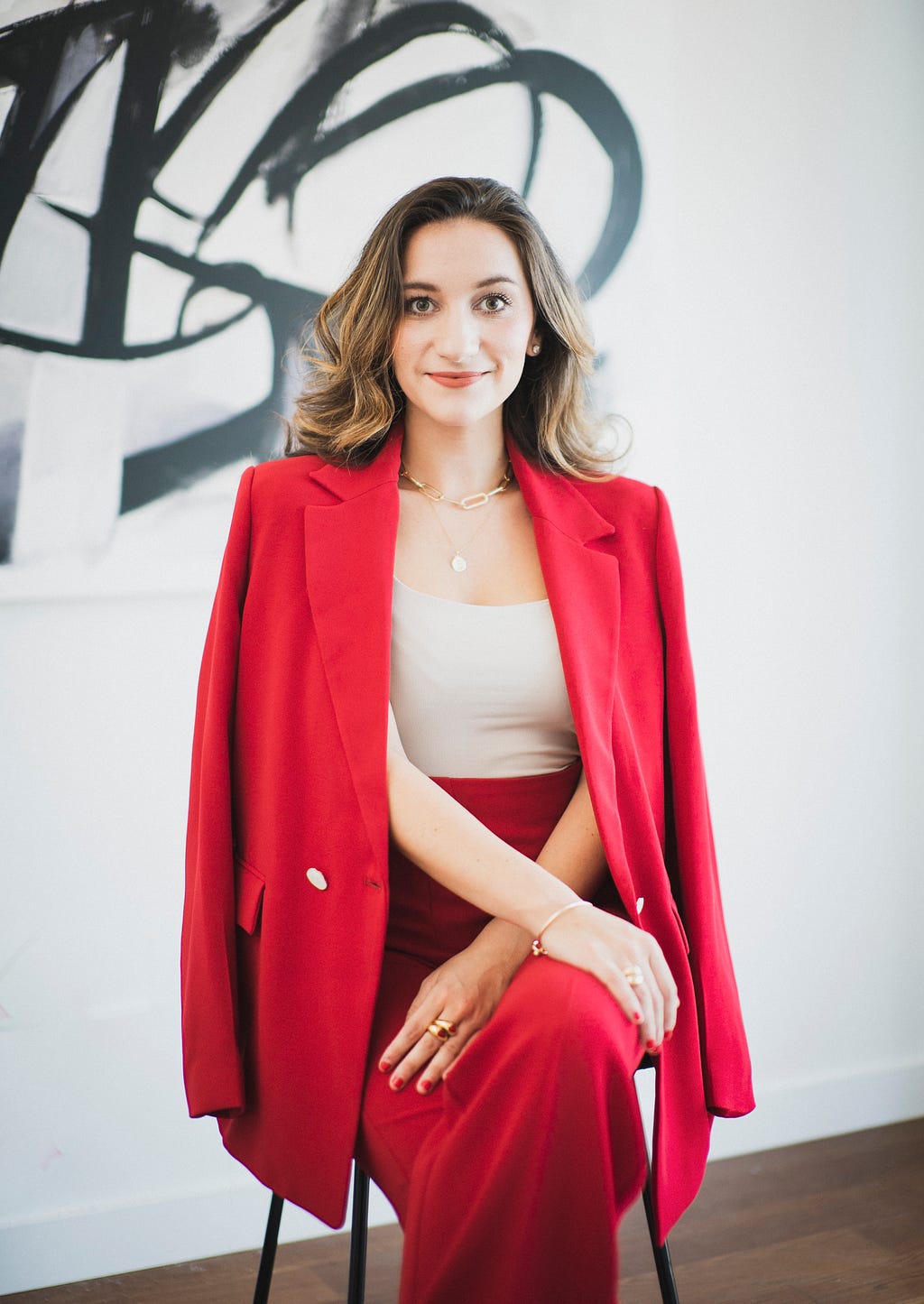
Trust Your Gut — When I went through my first round of fundraising, there were so many investors who told me what I needed to do. “Get a male co-founder, get a chief technology officer, build a different type of business..” At first, I took their advice and spent a lot of time trying to find a CTO and force a co-founder fit even though I felt that was against what I really knew what the business needed. I ended up trusting my gut and not moving forward with any of the forced candidates. Instead, we found the best team and have been running at our dreams ever since.
As a part of our series about women who are shaking things up in their industry, I had the pleasure of interviewing Emily Hochman.
Emily Hochman is the Founder and CEO of Wellory, the anti-diet nutrition app on a mission to make personalized nutrition accessible for all. Wellory is a venture-backed startup based in NYC with a network of over 600+ health coaches, nutritionists, and dietitians all over the country. She is a certified health coach, founder of the Movemeant Young Professional Board and native New Yorker. Hochman has been featured in Forbes, Business Insider and named “13 Under 35 Innovators” by her alma mater, Bucknell University
Thank you so much for doing this with us! Before we dig in, our readers would like to get to know you a bit more. Can you tell us a bit about your “backstory”? What led you to this particular career path?
Wellory was started out of personal experience and need. It started in college, terrified of gaining the freshman fifteen. So I began dieting. And I’m a type A, so I really started dieting… and dieted and dieted and dieted. The outcome: none of the “guaranteed” results I wanted, and even worse, a horrible relationship with food. Then I got sick. Polycystic ovarian syndrome, hypothyroidism, pre-diabetic kind of sick. Chronic illness, medicated, threat of infertility kind of sick. “Take this medication” doctors said. With trust and respect, I just wasn’t ready to embark on a lifetime of medication at the ripe age of 22.
So, “no, thank you,” I said.
Fast forward 4 years, I turned to the health and wellness industry and dove head-first into nutrition to find a solution. Determined to answer the question “how do I get healthy?” I enrolled in the Institute for Integrative Nutrition and became a certified health coach. Most importantly, I learned over 100 dietary theories, the study of bio-individuality, and the power of a healthy relationship with food. And guess what? Food actually worked. No more sick.
Then (like the Pisces I am), I became obsessed. Obsessed with helping people learn about the power of food as medicine. Obsessed with helping others learn how to eat, what to eat and why to eat. Obsessed with the power that food has to transform the body in ways most don’t even think possible. The more I talked about my experience, the more I learned that everyone has their own relationship with food and yet, no one knew where to turn. Everyone wanted someone to talk to, to clear up confusion on diet trends and mostly, to provide education, support and accountability to make change that actually lasts.
So, I quit my job working at a tech startup in New York to answer the question: how do we connect the hundreds of millions of Americans who struggle with healthy eating with the hundreds of thousands of nutrition experts who can help?
And then Wellory began.
Can you tell our readers what it is about the work you’re doing that’s disruptive?
With a distinct anti-diet approach to nutrition, we’re disrupting an antiquated nutrition space. For years, food apps have focused on meticulous ingredient logging, calorie counts, macros, and do’s/don’ts when it comes to what we eat.
At Wellory, we’re taking a drastically different approach, focusing on qualitative nutrition over quantitative tracking. And at the core of what we do, are strong, 1–1 human relationships between our coaches and our clients.
The client experience is designed to be flexible, because no two clients are the same. Think unlimited Q&A, personalized recipe ideas and shopping lists, and progressing habit by habit at your own speed. With this new approach to nutrition, we’re helping clients make sustainable, incremental nutrition changes over time.
Not only are we building a new category for consumers, but we’re also disrupting the age old antiquated nutrition industry and serving licensed nutritionists, registered dietitians and certified health coaches with new tools, science, and resources to help them do their jobs best.
Can you share a story about the funniest mistake you made when you were first starting? Can you tell us what lesson you learned from that?
Hmmm — I have to be honest, this is a tough question for me! I take my company probably too seriously and so I can’t think of any funny mistakes I’ve made.
We all need a little help along the journey. Who have been some of your mentors? Can you share a story about how they made an impact?
Liz Wessel, CEO and Co-Founder of WayUp has been a huge mentor to me, as a female founder, CEO and innovator. She’s always been so honest with me, understanding the founder perspective and fundraising landscape.
In today’s parlance, being disruptive is usually a positive adjective. But is disrupting always good? When do we say the converse, that a system or structure has ‘withstood the test of time’? Can you articulate to our readers when disrupting an industry is positive, and when disrupting an industry is ‘not so positive’? Can you share some examples of what you mean?
For the first time in American history, life expectancy is declining due to a poor diet. According to the NYTimes, 88% of American adults are considered high risk of COVID-19 due to diet-related disease. 82% of people who go on a diet end up gaining more weight within 2 year than they lost back. With these stats staring us in the face, it’s clear that the nutrition industry is in need of disruption. This is when disruption is a positive thing — because by reimagining the way things are done, we can create a more effective approach to better nutrition and change these statistics.
I’m a big believer in continuous improvement. To me, disruption implies that something is broken, and that rather than continuing down the same path, it’s time to break off onto a new one and create change. We’re currently in a national nutritional crisis and something has to change!

Can you share 3 of the best words of advice you’ve gotten along your journey? Please give a story or example for each.
- Never Quit — My mom is an entrepreneur and has always told me the #1 best thing I can do is to never give up. It’s my job to continue learning, building, and breathing life into the business. It may take different forms over time as we grow but the most important thing is to just never quit.
- Trust Your Gut — When I went through my first round of fundraising, there were so many investors who told me what I needed to do. “Get a male co-founder, get a chief technology officer, build a different type of business..” At first, I took their advice and spent a lot of time trying to find a CTO and force a co-founder fit even though I felt that was against what I really knew what the business needed. I ended up trusting my gut and not moving forward with any of the forced candidates. Instead, we found the best team and have been running at our dreams ever since.
- Do The Work — Business building means doing the work. I believe so much in rolling my sleeves up and diving in to make sure I have all the answers necessary to make decision moving forward. This usually means doing the hard work — even when I don’t want to.
We are sure you aren’t done. How are you going to shake things up next?
We’ve got a lot of exciting things coming up, we’re just getting started, We’re hiring for a ton of roles in early 2021, expanding our product offering significantly and starting to partner with some incredible companies. Be on the lookout for tons of updates and growth from our team.
In your opinion, what are the biggest challenges faced by ‘women disruptors’ that aren’t typically faced by their male counterparts?
“Women disruptors” have to show so much more value and traction. We have to prove concepts to get conviction instead of just talking about it. This is evident in the amount of capital that goes to female founders and the amount we have to prove to get that capital.
Do you have a book/podcast/talk that’s had a deep impact on your thinking? Can you share a story with us?
I’ve listened to almost every episode of “How I’ve Built This” by Guy Raz. Listening to other founders stories is so inspiring to me and has helped me think through a lot of the early day opportunities. I get inspiration from how other entrepreneurs think about problem solving and the steps they took to get to where they are.
You are a person of great influence. If you could inspire a movement that would bring the most amount of good to the most amount of people, what would that be? You never know what your idea can trigger. 🙂
Eat healthy! Focus on eating real whole and start eating real whole foods. And sign up for Wellory while you’re at it to get the help you deserve. 😉
Can you please give us your favorite “Life Lesson Quote”? Can you share how that was relevant to you in your life?
“Don’t quit.” This is something I subscribe to every single day and truly believe in the power of continuing to grow, learn and evolve. As long as you don’t quit, you will figure out what steps you need to take to get to where you need to be… and everything happens for a reason, so keep going!
How can our readers follow you online?
I’m most active on Instagram (@ebhochman) or Twitter (@ebhochman).
Female Disruptors: Emily Hochman of Wellory On The Three Things You Need To Shake Up Your Industry was originally published in Authority Magazine on Medium, where people are continuing the conversation by highlighting and responding to this story.

